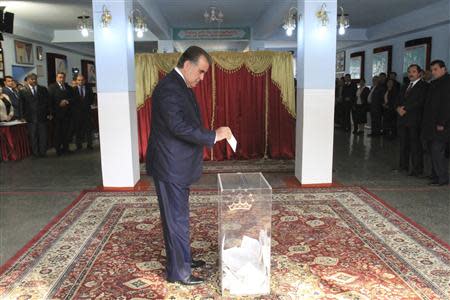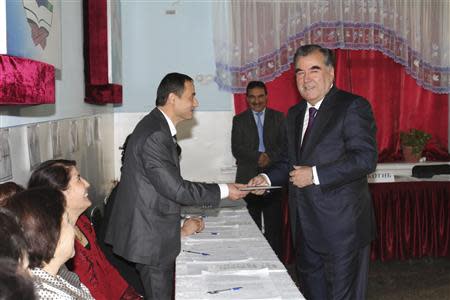Tajik leader extending long rule in volatile region
By Roman Kozhevnikov and Dmitry Solovyov DUSHANBE (Reuters) - Tajik President Imomali Rakhmon looked set to win a new seven-year term on Wednesday, demonstrating his grip on a Muslim Central Asian state beset by poverty and facing security threats from neighboring Afghanistan. The former head of a Soviet state farm, who has been in power since 1992, is running in presidential elections against five little-known, mainly loyal candidates who pose no threat. The only genuine opposition candidate was unable to run. But critics say Moscow-backed Rakhmon, 61, faces mounting social tension in the former Soviet republic where about half the 8 million population live in poverty. More than a million work abroad, sending money home to their families. Voters streamed to polling stations in the center of the capital Dushanbe, where billboards showing Rakhmon dominate. Young people voting for the first time were given bunches of flowers. Tajik music blared on loudspeakers. "Our president is good, so we voted for him," said pensioner Zikiriyo Sharipov. Housewife Nazira Karaboyeva said she had opted for stability under Rakhmon and "for everything to stay as good as it is right now". "I voted for his excellency, for prosperity and freedom," she added. Tens of thousands died in a 1992-1997 civil war after the Soviet Union collapsed. Tajikistan remains a poor country in a region riven by ethnic divisions. Conflicts have occurred in neighboring Kyrgyzstan. Uzbekistan, courted by the West and Russia for its energy resources and strategic position, has suffered sporadic bombings and shootings authorities blame on Islamist militants. Tajik state television showed Rakmon live as he cast his ballot. He made no comments. No foreign media were allowed. Polls close at 8 p.m. (1500 GMT), and first official results are expected early on Thursday. Rakhmon, like other Central Asian leaders, could face security threats from Islamist militants in neighboring Afghanistan after the planned withdrawal of U.S.-led forces in 2014. Tajikistan also lies on a heroin trafficking route from Afghanistan to Russia and Europe. Rakhmon did not conduct an election campaign, relying on extensive media coverage of trips across the country where he was met by jubilant crowds reciting poetry glorifying him. In Dushanbe, he looks down from huge billboards, and stickers of him are plastered across the windscreens of taxis and buses. The other five candidates are featured mainly on modest leaflets at bus stops. By barring moderate opposition candidate Oynihol Bobonazarova for not getting enough signatures of support, secular authorities risked radicalizing opponents. Bobonazarova, a 65-year-old human rights activist, is backed by the Islamic Revival Party, Tajikistan's second-largest political force, and by the opposition Social Democratic Party. DIVIDED OPPOSITION Many of Rakhmon's opponents in the civil war won by his secular government are now in the Islamic Revival Party. But the opposition is weak and disparate, and there is official pressure on media and those accused of preaching radical Islam. Bobonazarova said Rakhmon had developed a personality cult and people hid their true feelings. "We have so many problems, and they (people) keep singing odes in his honor. They extol him, and later on they say terrible things about him," she told Reuters before the vote. She said activists collecting signatures of support for her had been summoned by prosecutors and intimidated by the secret service. Rakhmon's press service declined comment. The West has not recognized a single election in Tajikistan to be free and fair. Rakhmon, who has increased the number and length of his terms by revising the constitution through a referendum, won 79 percent of the vote in the previous election in 2006. His next term must be his last, according to the constitution. In October, Dushanbe ratified a deal with Moscow under which Russian soldiers will be deployed at a base in Tajikistan for three decades. In return, Tajik officials said, Rakhmon won a deal allowing some duty-free imports of oil products and agreement by Moscow not to get tougher on Tajik migrants. Rakhmon has repeatedly voiced concerns that the spread of a militant form of Islam similar to that of the Taliban in Afghanistan could shatter the fragile peace in his country. The Moscow-led Collective Security Treaty Organization, which unites six former Soviet republics, said in September that it would provide "additional collective assistance" to Tajikistan to guard its border with Afghanistan after the pullout of most U.S.-led combat troops in 2014. Russian border guards used to patrol the Tajik frontier with Afghanistan but left in 2005. (Writing by Dmitry Solovyov, Editing by Timothy Heritage and Ralph Boulton)



